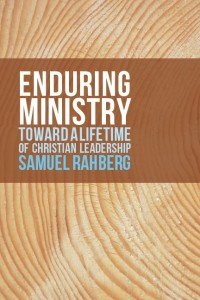Poem: Ice Break
On the far edge of winter
a frozen lake quakes and groans
as a warm sunrise hints at Spring.
Faith & Leadership: Befriending Your Limits
Part of effective Christian leadership is learning when to reach beyond and when to accept our own limitations. A spiritual director offers some thoughts and advice on how to do that. This article was first published on 7 Mar 2017 in Faith & Leadership from Leadership Education at Duke Divinity. Editor's note: This reflection is adapted from Rahberg’s book, “Enduring Ministry: Toward a Lifetime of Christian Leadership.”
Enduring Ministry Reflection, Celebrating the Release
This past week I found myself right at home in Mark 6. The disciples are sent out two by two, preaching, casting out demons, and anointing the sick. After a time they return to Jesus and tell “him all that they had done and taught” (6:30, NRSV) Jesus replies, "Come away by yourselves to a deserted place all by yourselves and rest a while" (31). Sometimes that's exactly what we want to hear, the expectation we have as we climb into the boat with Jesus. Listen for what really happens: “Now many saw them going and recognized them, and they hurried there on foot from all the towns and arrived ahead of them” (33). The disciples did not get the deserted place they wanted. What the disciples do get is a boat ride with Jesus between crowds. This book and this evening is about the boat ride. What happens, what needs to happen when we're sent out, when we're serving, and when we're on the boat journeying with Christ on the way to the next crowd so that we get off the boat and continue serving like Jesus? “As he went ashore, he saw a great crowd; and he had compassion for them, because they were like sheep without a shepherd; and he began to teach them many things” (34). Whatever happened on that boat, Jesus sets foot ashore and demonstrates an enduring ministry.
The Gospel of John in Poem and Image
The Gospel of John opens with rich poetic imagery and unfolds into twenty-one chapters full of symbols and signs that point to Jesus Christ as truly human and truly divine. This collection of fifty-six reader's poems, combined with twenty-six original pieces of art printed in full color, offers an inviting first read to those new to the Gospel and fresh perspective to those long familiar with its themes.
There is no substitute for reading the Scriptures themselves again and again. This resource, in fact, flows directly from that kind of sustained reading. Like artists throughout the centuries, siblings Samuel Rahberg and Natalie Rahberg have employed the disciplines of writing and visual art to share with others the fruits of their own prayer. May each reader be led back to the Christ revealed in the Gospel of John.
Reader's Poem: After the Ecstasy, the Laundry
The real journey is finding our home. Life becomes simple and whole, painful as well as beautiful. Where we already are is the path and the goal. Release habits of grasping, aversion and fear. Circumstances of life will insist on getting our attention. Stop evading the truth. Spiritual life is not about knowing much, but about loving much. Meet each personas brother and sister. Service is the expression of the awakened heart. One step at a time, one person, one moment. This moment.
God Gives the Fire: Thomas Merton on Promethean Theology
I recently finished reading Thomas Merton's The New Man (New York: Farrar, Straus and Giroux, 1961) and found his chapter on Promethean theology (p. 21-48) too intriguing to keep to myself. A Promethean theology, in Merton's view, ultimately presumes that freedom must be won or taken. Merton uncovers this faulty notion by examining an ancient Greek myth alongside the struggle of modern Christians to let the radical and complete grace of God wash out any subtle attempt to win favor and worth. The fire of our identity and belonging is pure gift, Merton argues convincingly. Rather than attempt to relay his masterful chapter, I offer here a brief introduction to the Promethean Myth and some highlights to guide your own reflection. Linger with them until you reach the last piece, The Soul Is Like Wax, which is a beautiful and related image also written by Merton.
Boundaries: A Matter of Freedom and Life
I find it easier to practice boundaries within the context of spiritual direction than I do the flow of life and responsibilities outside of those relationships. This became clear to me after re-reading Boundaries by psychologists Henry Cloud and John Townsend [Zondervan, 1992]. Nearly twenty years after first reading this best seller, I still surprise myself some days by being clear and relaxed as a spiritual director, only to lose my sense of groundedness moments later in another setting. What can we learn from spiritual direction relationships that helps us keep practicing boundaries in others?
Andrei Rublev's Faithfulness and Creativity in the Icon of the Trinity
Henri Nouwen observed that Rublev's Icon of the Trinity (1425 A.D.) would leave us in distant awe of the divine mystery if it did not so profoundly invite us into deeper intimacy with God (Behold the Beauty of the Lord: Praying with Icons, Ave Maria Press: 1987. Kindle Edition, location 143). The icon reveals something important to us about vocation, Nouwen suggests, if we look closely enough to notice the circle and the cross.
Poem: Seoul Vespers
When pilgrims hear only music in sounds that mean something to those at home, there is no choice but to feel the way into prayer. One can watch for the right time to rise, to bow, to sit. One can listen for the lilt of psalms, hymns and readings. One might even glean a Christo, Maria or Amen, as clear young voices chant in single tones or one side after the other makes balance. Feeling all this, they move beyond listening. Like the winged choir perched on Asian pines nearby, pilgrim hearts draw in close, chirping into the silence, unable to resist the song.
Reader's Poem: Living With Contradiction
It is curiously liberating to realize that tensions become life-giving. Christ walked in constant awareness of the world’s pain and beauty. I must accept myself in contradictions and contradictions in me. In Christ all things are held together. Recognize Christ’s love. Let yourself receive that love.
Good Zeal (Rule of Benedict, 72)
Benedict of Nursia (ca. 480-547) is one of the voices from Christian tradition who continues to help us understand what it means to walk together toward Christ the Light. The grand finale to the Rule of St. Benedict (RB) comes in chapter 72 on the topic of what Benedict calls "good zeal". (Bit of trivia: scholars agree that RB 73, the actual last chapter, functions as a bibliography). Having reached the bookend of all the wisdom collected in previous chapters, we might rightly wonder about Benedict's punch line for this vision of life in Christian community.
Poem: Lukewarm
Neither too hot nor too cold
is the greater danger
to common life.
Hot heads fuel fear,
cold hearts still harmonies,
yet nothing sours the will for good
like the bite of indifference.
“Behold,” the Holy One calls, “I stand at the door and knock.”
We may not have
the fire to drive him away
nor the ice to refuse him,
but let us not be caught
humming to ourselves,
pretending he’s not there.
Set down tepid ways,
rise up,
and put a hand to the latch.
Reader's Poem: Life Together
Community is a reality created by God in Christ.
We are reverent listeners and participants in God’s sacred story.
In fellowship we learn to be alone; in aloneness we learn to live rightly in fellowship.
Ultimately, we have no charge but to serve our brothers and sisters, for they stand as signs of God’s truth and grace.
Praying Grace-Fully
From biblical times through the modern day, Christians have asserted that the practice of prayer is essential to the life of discipleship. Unfortunately, prayer can also become a source of shame and inadequacy. Who among us doesn’t feel that our prayer life isn’t what it should be?
Poem: Ceaseless Prayer
What is the point of discipleship
if not to live truthfully
in the Divine Presence,
to make our way, ready for thein-breaking of God’s grace?
Like desert monks we saturate
ourselves with Scripture
that we, too, might dwell in the Word
and put on the mind of Christ.
We who practice
receiving God’s touch
and waiting through its absence
cannot resist meeting joys and challenges
with more and more transparency.
Centeredness wells up
as biblical words and symbols
begin grounding priorities and decisions
in something other than mere ego.
The fullness of Christian life
spills over, then,
into convictions and actions
that serve the greatest good.
Call it prayer, call it lectio,
but do not let it be confined
to quiet moments before dawn.
Befriending Your Limits
By the time you find yourself drawn to the phrase "befriending your limits," you have likely built a home between a mountain and a shoreline. The desire to seek new perspective may well be an invitation that involves some element of discomfort . . . and a dash of hope. This peculiar mix suggests to me that God is at work and that it is time to pay attention. We cannot help but respond with honesty.
How To Foster A Healthier Year In Ministry
Most Christian leaders can understand the way the most sincere intentions for well-being too easily give way to the everyday demands of ministry. Even so, with the new year upon us, something deep inside refuses to dismiss the impulse of grace and promise in a new beginning.
As a spiritual director, I hear people express both the desire for new beginnings and the sense of being stuck. This reminds me that I am not alone.
Poem: Woodland Love
There is a beauty to these woods
that surpasses even the twilight
sound of the Great Horned Owl
or the crescent moon spilling stars
onto cedar tops and pines.
Reader's Poem: Being Mortal
Death is not failure. Death is normal.
Sooner or later independence will become impossible.
Medicine has transformed life into a long, slow fade.
The trouble is we expect more from life than survival.
When life’s fragility is primed ,goals and motives shift completely.
T
Poem: As A Shadow
Were I to sit with the setting sun
warm upon my face,
she might cast a long shadow
of the man I want to be.
The dark form waits patiently,
watching, growing
whether or not anyone looks on.
When brightness makes clear
what does not belong,
it shows more clarity and depth
than cold refusal.
The shadow is sure and ever-faithful,
sometimes cloud-hidden,
never truly absent.
Should darkness fall it does not flee
but settles calmly into
grace-filled unknowns.
May I become one such shadow—nearly unnoticed—a steadfast reminder of the sun.
























